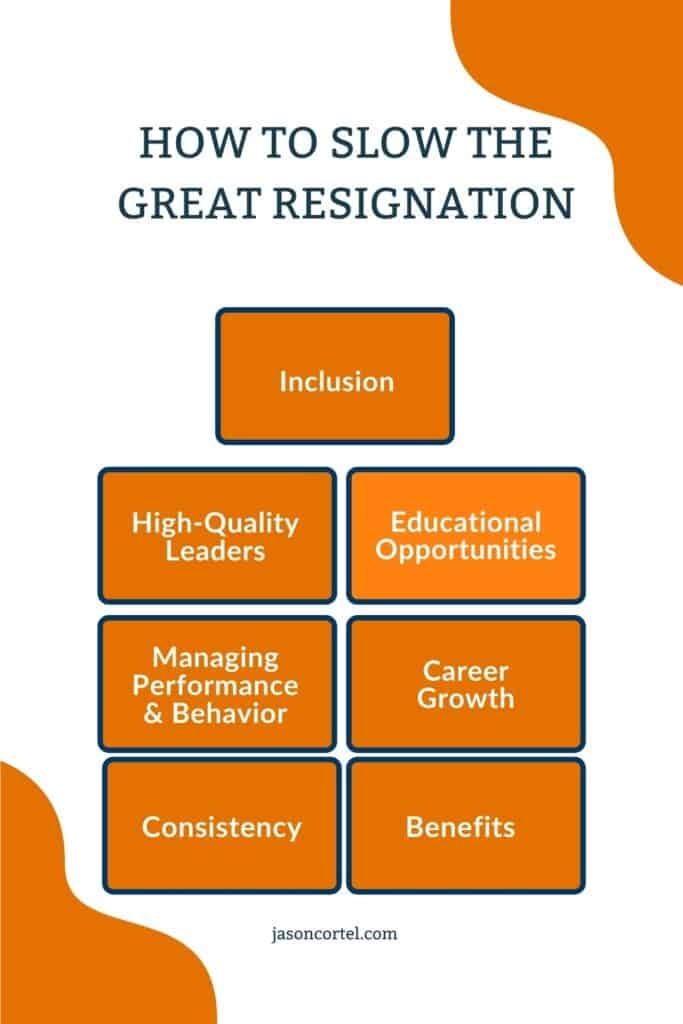Employees are the backbone of any organization. They work day in and day out tirelessly to help your business thrive. Yes, employees get compensation to perform in their roles. However, employees invest the most precious commodity in their employer, their time. As a result, they want to feel their employer is equally investing in them. Employers want loyalty but unintentionally do things that demonstrate loyalty isn’t a two-way street. Preventing a mass exodus like The Great Resignation isn’t about high-level feel-good quotes on purpose or finding meaning in your job. This blog post will discuss what organizations can do to stop The Great Resignation and attract applicants to fill their vacancies.
The pandemic brought about the phrase essential workers. Suddenly there were signs everywhere calling them heroes and praising their dedication. But, later, it became apparent it wasn’t about essential workers. Instead, it was about essential jobs, especially when it came to foodservice. Just look at the Kellog’s strike. It is as if on January 1, 2021, all the good that happened toward employees vanished. Even more, organizations have a history of treating employees and replaceable.
Recruiters have ghosted applicants for years and are suddenly finding themselves ghosted. Employers have terminated employees without notice and are now upset employees are ghost-coasting. The tables have turned and employers aren’t happy. To make matters worse, The Great Resignation has caused organizations to neglect the employees who stay and keep the business moving forward.
The Great Resignation
Anthony Klotz predicted a voluntary mass exodus from the workforce in 20219. There are no shortages of articles encouraging more employee appreciation to retain talent. Some companies have implemented retention bonuses. Businesses are trying to attract applicants with the promise of wacky wages and sign-on bonuses. Other articles suggest employees want work-life balance, a job with purpose and meaning, greater flexibility. Some articles even suggest employers need to focus on the needs and wants of younger employees because they are the drivers of The Great Resignation.
Starting wages keep going up, bonus amounts go higher, and employers are placing a greater emphasis on their purpose. However, employers are still struggling to fill their vacancies and The Great Resignation continues. So while more money is great, it doesn’t take too much time to pass before the money is no longer worth it, especially since you can go to the next company for another x percent wage increase.
Work-life balance and job flexibility only work when the employee has a manager who cares for them. Likewise, having a job with purpose and meaning only matters when employees feel their contributions and passion for the job are respected. When your retention efforts target a specific age group, all others feel alienated. None of this is changing the course of the Great Resignation. None of these recruitment marketing initiatives are attracting new talent. Why? Because these efforts do little to change the lives of the employees.
How to Change Course of The Great Resignation and Fill Job Vacancies
I heard a quote several weeks ago that has really stuck with me. The deepest purpose of business is to change the lives of the people who work there. When employees feel their employer changes their life, they will enthusiastically stay. Even more, they will give the employer loyalty. So how can businesses change the lives of employees and change the course of The Great Resignation?
Inclusion
The quote says the deepest purpose of business is to change the lives of the people who work there. It doesn’t say some people. It says the people. Growing up, I never fit in at school. Always the last picked to join a random team. I never had a group of people I ran with. However, that all changed when I got my first job. To me, work has meant inclusion, so that is the experience I want for my peers and direct reports. I want that inclusive feeling for everyone. Giving people a place to spend most of their waking days feeling wanted, welcomed, and valued is fundamental to changing their lives and slows the Great Resignation.
High-Quality Leaders Slow The Great Resignation
People leave bosses, not companies. How your leaders and managers treat people will change their lives. The change can be good, or it can be miserable. Have you ever read comments about managers in Glassdoor reviews? Low-quality managers and leaders will cause you to be “that company.” Retaining managers and leaders who treat people poorly is unforgivable. That is what makes people leave, and with The Great Resignation, they have options and opportunities to do so. Getting rid of bad bosses will slow The Great Resignation.
Educational Opportunities
Employees want to feel they are making progress. Therefore, organizations need to offer a robust training program to help them grow their skillset. In addition, employees want to continue their education. So many employers now offer fully paid college, and some even include books and materials. Providing employees with educational opportunities is a demonstration of investing in them. Training and education change employees’ lives and slows The Great Resignation.
Managing Performance and Behavior Issues
20% of employees do 80% of the work. Why is that tolerated? Employees want to know their peers are working as hard as they are. They don’t want performance issues and bad behavior to persist without consequence. Otherwise, why should they try so hard? Even more, why should they care when it is apparent management doesn’t? It goes back to keeping bad managers and leaders around. If they aren’t managing and holding their employees equally accountable, they need to be managed out of the organization.
 Career Growth Opportunities
Career Growth Opportunities
Some employees are happy to stay in their roles. They do a good job and have an abundance of historical knowledge of the company and its products. So why is there a cap on their pay? Others want to advance and get more responsibility. So they come to work enthusiastically every day and keep the wheels moving forward. Offering career growth opportunities help employees feel they are advancing, which will make them more loyal. When advancement opportunities or pay increases are scarce, or their employer defaults to hiring from outside the organization, employees will leave because they can get a higher title and more pay elsewhere. Providing opportunities for employees to grow their careers or paying them fairly for their skills and knowledge changes lives. Helping employees grow their careers slows The Great Resignation.
Consistency
Employees want consistency. They don’t want to deal with a Jekyll and Hyde boss. They don’t want a leader who wears two masks. Employees want to know the rules apply to everyone. They want expectations that are fair and consistent and subsequent disciplinary actions that are equally applied. When employees see inconsistency in how others are treated or policies enforced, they feel the playing field isn’t level. They don’t know what good looks like and they don’t know what to expect. As a result, they move on to an organization where they have a chance of being successful. Providing equal opportunity based on merit changes employees’ lives and slows The Great Resignation.
Better Benefits
How competitive is the total compensation? Employees want enough vacation time to unwind and destress. They want time to spend with their family or to attend their child’s extracurricular activities without the guilt of leaving work early. They want insurance for their family that is affordable and meets the needs of their family. Employers who offer continuing education or professional certifications are growing, and it is a sign the employer is investing in their employees. Better benefits allow employees to care for their family and that changes lives and slows The Great Resignation.
The tech industry ushered in an era of providing a ton of at-work benefits—free cafeterias, games, pet and child care, onsite medical, etc. At first, these perks drew huge crowds. However, over time, employees realized employers offered those things to keep them at work longer. As a result, employees no longer view them as benefits.
Slowing The Great Resignation and filling your open vacancies will happen by investing in employees. When you invest in employees, they respond with loyalty and dedication. They care about their job and the work they are doing, which benefits the organization. Investing in employees results in higher profits, increased sales, higher customer satisfaction. Above all, investing in employees increases retention and slows The Great Resignation.


 Career Growth Opportunities
Career Growth Opportunities